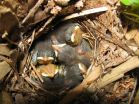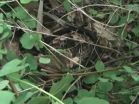(Press-News.org) The song of the male nightingale tells females how good a father he will be, according to research published in the open access journal BMC Evolutionary Biology.
The study shows that better singers will feed their offspring more often, and that they advertise this to potential mates by singing in a more orderly way through repeating song sequences, and using more variable song, including many different 'buzz', 'whistle' and 'trill' songs.
In around 80% of all bird species, males play a key role in raising their young. Male nightingales feed the female during incubation, provide food to chicks and defend the nest against predators. A male's parental skills are therefore likely to be a crucial factor for females when choosing a mate.
Female birds assess paternal qualities on the basis of traits, including plumage coloration and courtship behaviour. In nightingales, it is a male's elaborate nocturnal song prior to pair formation that is presumed to be key in advertising their skills as a father. While male birds are able to sing around 180 different song types, little has been understood on the exact song features that are important.
Lead author Conny Bartsch from Freie Universität Berlin, Germany, said: "It has long been thought that a single feature - the size of a bird's song repertoire - may be important for females during mate choice. But our study shows that, in nightingales, it is a mix of specific song features that seem to be more important in determining their paternal efforts.
"These song features have never been described before in any other species, and include the sequential ordering of songs and the use of acoustic structures that are most probably challenging to produce. We were surprised that multiple song features - instead of one 'key' song feature - were related to male feeding effort."
The researchers studied the link between the quality of a male song before pair formation, and how good a parent he then was, based on the rate at which he provided food to his chicks. They studied 20 male nightingales, recording and analysing their nocturnal singing early in the breeding season. Following pair formation, they analysed video footage of their nests and data from electronic tags attached to the birds to record male visits and determine the level of paternal care.
They found that male nightingales contribute substantially to chick feeding, at an equal level to females (around 16 nest visits per hour on average).
Several different song features were linked to greater paternal efforts by male nightingales. These included having a more ordered singing style - repeatedly singing the same sequential order of song types. Males that sang more complex song repertoires, indicated by many different 'buzz', 'whistle' and 'trill' song types, also contributed more to chick feeding.
Since male nightingales are essentially involved in chick rearing, paternal investment might be a crucial variable for females in choosing a mate. These song features may therefore have evolved to signal direct benefits to females when assessing their mate's potential in future paternal care.
For species with complex song, such as the nightingale, the study suggest that females rely on multiple song cues to quickly gather information about their potential partner and inform mating decisions.
Song orderliness is also known to be associated with male nightingale age. This suggests that ordered singing could serve as an indicator of experience with the breeding grounds, and could mean further benefits for females choosing males with this singing quality.
INFORMATION:
Media Contact
Joel Winston
Media Officer
BioMed Central
T: +44 (0)20 3192 2081
M: +44 (0)7766540147
E: Joel.Winston@biomedcentral.com
Notes to editor:
1. For more video, audio and images of the research, these are available here: http://bit.ly/1JSRHNF
Please credit Conny Bartsch in any re-use.
2. Research article
Conny Bartsch, Michael Weiss and Silke Kipper
Multiple song features are related to paternal effort in common nightingales
BMC Evolutionary Biology 2015
doi 10.1186/s12862-015-0390-5
For an embargoed copy of the research article, please contact Joel.Winston@biomedcentral.com
After embargo, article available at journal website here: http://dx.doi.org/10.1186/s12862-015-0390-5
Please name the journal in any story you write. If you are writing for the web, please link to the article. All articles are available free of charge, according to BioMed Central's open access policy.
3. BMC Evolutionary Biology is an open access, peer-reviewed journal that considers articles on all aspects of molecular and non-molecular evolution of all organisms, as well as phylogenetics and palaeontology.
BMC Evolutionary Biology is part of the BMC series which publishes subject-specific journals focused on the needs of individual research communities across all areas of biology and medicine. We offer an efficient, fair and friendly peer review service, and are committed to publishing all sound science, provided that there is some advance in knowledge presented by the work.
4. BioMed Central is an STM (Science, Technology and Medicine) publisher which has pioneered the open access publishing model. All peer-reviewed research articles published by BioMed Central are made immediately and freely accessible online, and are licensed to allow redistribution and reuse. BioMed Central is part of Springer Science+Business Media, a leading global publisher in the STM sector. http://www.biomedcentral.com
The recent craze for human breast milk amongst certain fitness communities, fetishists and chronic disease sufferers is ill advised say the authors of an editorial published today by the Journal of the Royal Society of Medicine. There is a lucrative online market for adult buyers of human breast milk, with websites and forums describing it as a 'clean' super food that can lead to gains in the gym, and even help with erectile dysfunction and cancer. There are claims that it is more digestible and contains positive immune building properties. The authors, led by Dr Sarah ...
Partnerships with multinational companies in child health programmes can work to help save lives, write the co-founders of charity ColaLife in The BMJ this week. But an academic argues that connections between multinational companies and child health projects present an ethical minefield.
ColaLife, a charity formed by British couple Simon and Jane Berry, worked with Coca-Cola to learn about the distribution channels the company uses in developing countries. With this knowledge, they devised a system to ensure life saving treatments reach children with diarrhoea in remote ...
Up to 22 percent of surgical patients experience unexpected complications and must be readmitted for post-operative care. A study led by the University of Utah suggests that returning to the same hospital is important for recovery. Readmission to a different hospital was associated with a 26 percent increased risk for dying within 90 days.
The results, published in The Lancet, have implications for patients who take part in domestic medical tourism programs.
Some of the nation's largest businesses encourage employees to travel to large U.S. medical centers for complex ...
Patients rehospitalized with complications after major surgery are 26% more likely to survive if they return to the hospital where they had their operation compared to those readmitted to a different hospital, according to a national study involving over 9 million Medicare patients in the USA, published in The Lancet.
The findings stand in contrast to current health policies that aim to regionalise major surgical procedures into high volume centres of excellence.
"With up to one in four patients rehospitalized following complex surgery, our results could potentially ...
In The BMJ this week, two doctors criticize Australia for passing legislation that may be used to silence doctors working with asylum seekers.
The Border Force Act 2015 says that from July 2015 contracted workers including doctors, nurses, and other healthcare professionals face a prison sentence of up to two years for blowing the whistle on substandard medical care given to asylum seekers in detention centres.
Dr. David Berger at Broome Hospital in Western Australia, argues that the only reason to suppress doctors in this way, 'is to avoid embarrassing revelations ...
Two Massachusetts General Hospital (MGH) physicians who participated in the international response to the major earthquakes that hit Nepal in April and May each describe their experiences in Perspectives articles receiving Online First publication today in the New England Journal of Medicine.
Renee Salas, MD, MS, was already in Nepal working at a Himalayan Rescue Association clinic in the remote village of Pheriche when the first 7.8 magnitude quake struck on April 25. As she describes in her article "Humanity, Teamwork and Art in Post-Earthquake Nepal," while the immediate ...
WHAT:
Researchers funded by the National Institutes of Health (NIH) have identified a new immune disorder--DOCK2 deficiency--named after the mutated gene responsible for the disease. An international team of collaborators studied five children, four boys and one girl, from different ethnic backgrounds who had experienced debilitating infections early in life. The children were diagnosed with combined immunodeficiency (CID), which refers to a group of inherited disorders distinguished by defects in immune system cells called T cells. CIDs also may affect other cells of ...
WASHINGTON, June 17 --- The value of the tax exemption provided to non-profit private hospitals in return for 'charity care and community benefit' nearly doubled over a nine-year period, climbing from an estimated $12.6 billion in 2002 to $24.6 billion dollars by 2011, according to a study funded by the Robert Wood Johnson Foundation and led by researchers at Milken Institute School of Public Health (Milken Institute SPH) at the George Washington University.
This growth in the value of the tax exemption underscores taxpayer interest in how hospitals allocate their community ...
MAYWOOD, Ill. - A genetic disorder called neurofibromatosis (NF) causes benign tumors to grow on the brain, spinal cord, and other parts of the nervous system.
There are no effective drugs to prevent or reverse NF. But increasing scientific knowledge has allowed for better clinical management and fewer complications, resulting in a higher quality of life for neurofibromatosis patients, NF specialists report in the Journal of Neuropsychiatry and Clinical Neurosciences.
Pediatric neurologist and NF specialist Nikolas Mata-Machado, MD, of Loyola University Medical Center, ...
Like homing pigeons, humans have a nose for navigation because our brains are wired to convert smells into spatial information, new research from the University of California, Berkeley, shows.
While humans may lack the scent-tracking sophistication of, say, a search-and-rescue dog, we can sniff our way, blindfolded, toward a location whose scent we've smelled only once before, according to the UC Berkeley study published today (June 17) in the journal PLOS ONE.
Similar investigations have been conducted on birds and rodents, but this is the first time smell-based navigation ...


